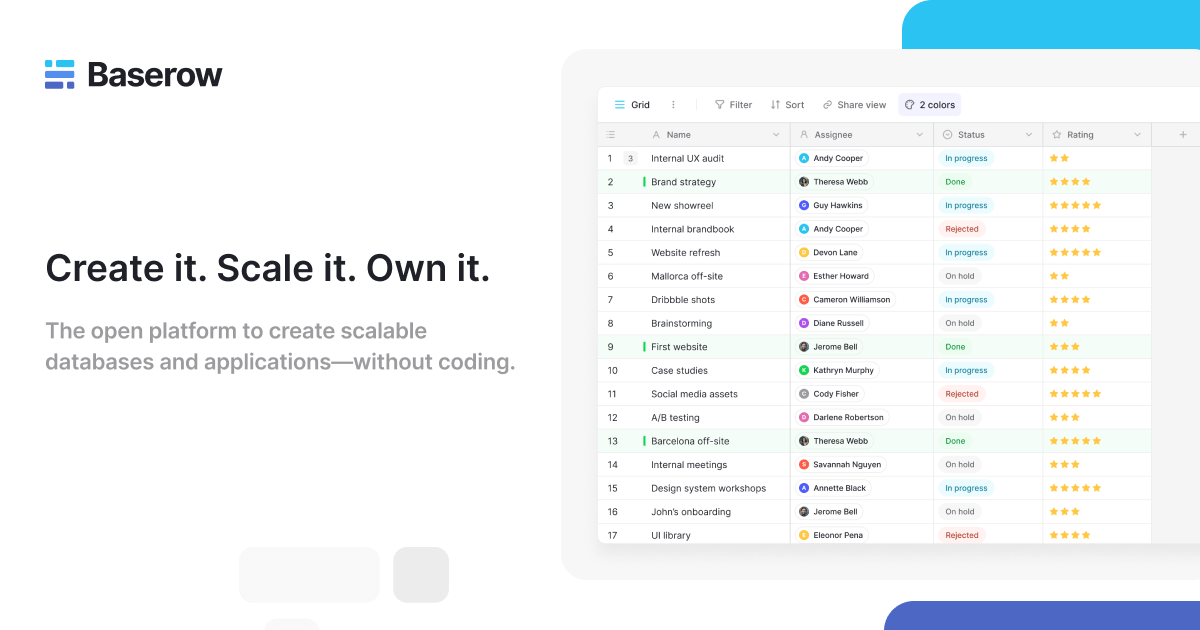Overview
Discover what makes AnyCable powerful
AnyCable is a high‑performance, self‑hostable real‑time communication server designed to replace the traditional ActionCable stack in Ruby on Rails and other web frameworks. It focuses on delivering low‑latency, reliable two‑way messaging by handling WebSocket connections at the protocol level while providing a Ruby‑friendly API for developers. The core idea is to offload heavy WebSocket handling from Rails, allowing the application layer to stay lightweight and scalable.
Low‑latency delivery
Message reliability
Back‑pressure handling
Transparent Rails integration
Overview
AnyCable is a high‑performance, self‑hostable real‑time communication server designed to replace the traditional ActionCable stack in Ruby on Rails and other web frameworks. It focuses on delivering low‑latency, reliable two‑way messaging by handling WebSocket connections at the protocol level while providing a Ruby‑friendly API for developers. The core idea is to offload heavy WebSocket handling from Rails, allowing the application layer to stay lightweight and scalable.
Key Features
- Low‑latency delivery – Built on a C++ core that manages WebSocket connections natively, AnyCable can serve thousands of concurrent clients with sub‑millisecond round‑trip times.
- Message reliability – Automatic resynchronization of missed messages during brief or extended disconnects, eliminating the need for custom reconnection logic.
- Back‑pressure handling – The server respects client flow control, preventing buffer overflows and ensuring graceful degradation under load.
- Transparent Rails integration – Developers can keep using
ActionCableDSL; AnyCable exposes a drop‑in replacement that routes traffic through its own transport layer.
Technical Stack
| Layer | Technology |
|---|---|
| Transport | C++ (libuv, ASIO) for WebSocket handling |
| Ruby API | Thin wrapper around the C++ core, exposing ActionCable‑compatible classes |
| Protocol | WebSocket + JSON message framing, with optional binary payload support |
| Persistence | Optional integration with Redis for pub/sub and message queueing |
| Deployment | Docker images available; can run as a standalone binary or inside Kubernetes |
The server itself is written in C++ for performance, while the Ruby wrapper uses FFI to interact with the native library. This separation allows developers to keep most of their logic in Ruby while benefiting from near‑native throughput.
Core Capabilities
- Channel subscription API – Mimics Rails’
ActionCable::Channelwith methods likesubscribed,unsubscribed, andreceive. - Broadcast helpers –
AnyCable::Channel.broadcast_toandbroadcast_fromfor targeted or global messaging. - Presence tracking – Built‑in support for tracking active connections per channel, useful for presence features.
- Authentication hooks – Developers can plug in custom authentication logic via
connection.authenticate!. - Metrics & monitoring – Exposes Prometheus metrics (connections, message rates, latency) for observability.
Deployment & Infrastructure
AnyCable is fully self‑hostable and can be deployed on any Linux host, VM, or container platform. Typical deployment scenarios include:
- Docker Compose – Single‑node development environments.
- Kubernetes – Horizontal pod autoscaling based on connection count; stateful sets for Redis.
- Bare metal – For ultra‑low latency, a dedicated C++ binary can run directly on the host.
The server requires minimal resources: a few GB of RAM for connection bookkeeping and a small CPU footprint per 1,000 concurrent connections. It can be paired with Redis for message queueing and persistence, though it also supports in‑memory operation for low‑latency use cases.
Integration & Extensibility
- Plugin system – Custom Ruby modules can extend channel behavior; the C++ core exposes hooks for low‑level events.
- Webhooks – Developers can expose HTTP callbacks that trigger on channel events (e.g., user joins/leaves).
- API – A lightweight HTTP API is available for administrative tasks such as listing active channels or broadcasting system messages.
- Cross‑framework support – While tightly coupled to Rails, the underlying WebSocket server can be used with any backend that speaks the same JSON protocol.
Developer Experience
- Zero‑code migration – Switching from ActionCable to AnyCable requires only changing the server URL; no changes to channel definitions.
- Rich documentation – The project hosts a comprehensive guide covering installation, configuration, and advanced topics.
- Community & support – Active GitHub discussions, Slack channels, and a dedicated mailing list provide timely assistance.
- Testing utilities – A Ruby test harness can simulate client connections, useful for CI pipelines.
Use Cases
- Collaborative editors – Real‑time document editing with guaranteed delivery during intermittent connectivity.
- Gaming backends – Low‑latency state sync for multiplayer games or leaderboards.
- IoT dashboards – Continuous data streams from sensors with automatic reconnection handling.
- Customer support chat – Reliable message delivery even when users switch networks or devices.
Advantages Over Alternatives
- Performance – Native C++ WebSocket handling outperforms pure‑Ruby solutions by an order of magnitude.
- Reliability – Automatic message recovery eliminates custom reconnection logic, reducing bugs.
- Cost‑efficiency – The open‑source version removes licensing fees; the Pro on‑premise variant offers enterprise features without vendor lock‑in.
- Flexibility – Drop‑in replacement for ActionCable means existing Rails codebases can adopt it with minimal effort.
In short, AnyCable gives developers a production‑ready real‑time engine that blends the familiarity of Rails’ ActionCable API with the speed and reliability of a dedicated WebSocket server, making it an attractive choice for any application that demands instant, dependable communication.
Open SourceReady to get started?
Join the community and start self-hosting AnyCable today
Related Apps in apis-services
Mastodon
Decentralized, real‑time social networking
Discourse
Open‑source community forum platform with real‑time chat and AI
Rocket.Chat
Secure, open‑source team communication platform
Novu
Unified notification platform for multi‑channel delivery
Mattermost
Secure, self‑hosted team collaboration with chat, voice, and AI
Jitsi Meet
Free, encrypted video conferencing for everyone
Weekly Views
Repository Health
Information
Explore More Apps
Operational
Real‑time event monitoring and alerting for startups

Baserow
Collaborative data platform for secure, no-code apps
Ergo
Modern, feature‑rich IRC server in Go
vod2pod-rss
Turn YouTube or Twitch channels into podcast feeds
QuickShare
Fast, secure file sharing across devices
Tamari
Your personal recipe manager and meal planner
